2023届高考英语复习名词性从句课件(40张ppt)
文档属性
| 名称 | 2023届高考英语复习名词性从句课件(40张ppt) |

|
|
| 格式 | pptx | ||
| 文件大小 | 2.5MB | ||
| 资源类型 | 教案 | ||
| 版本资源 | 通用版 | ||
| 科目 | 英语 | ||
| 更新时间 | 2023-02-08 00:00:00 | ||
图片预览



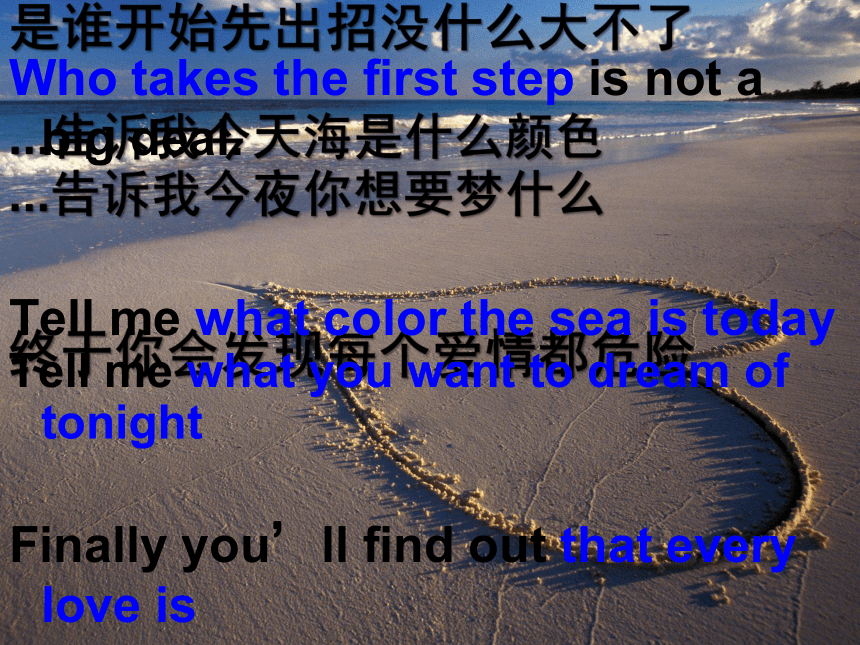
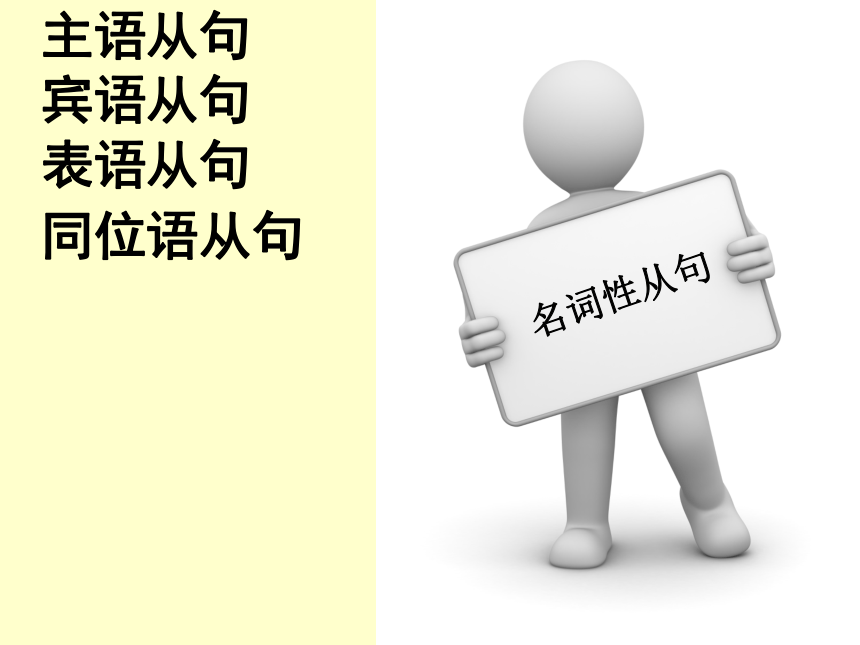
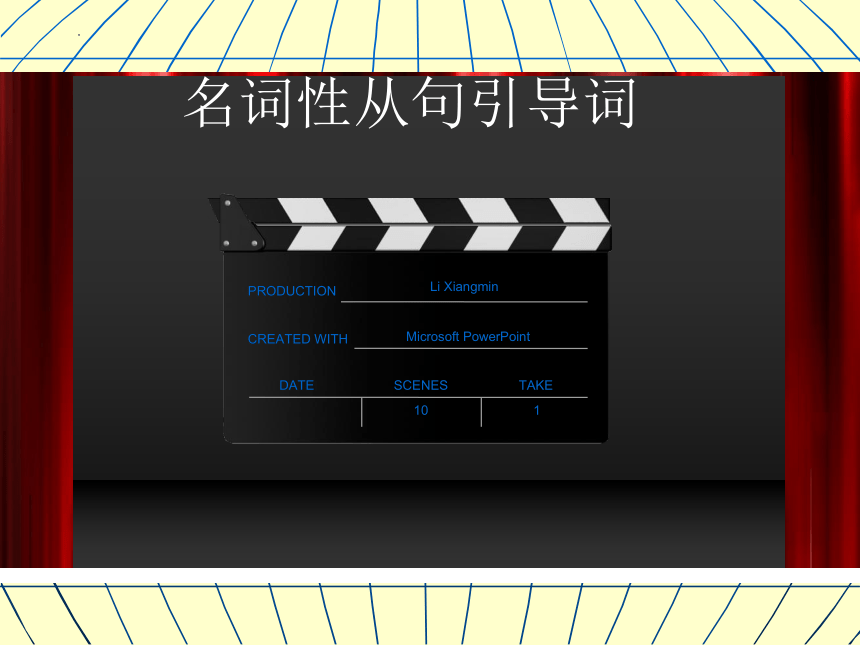
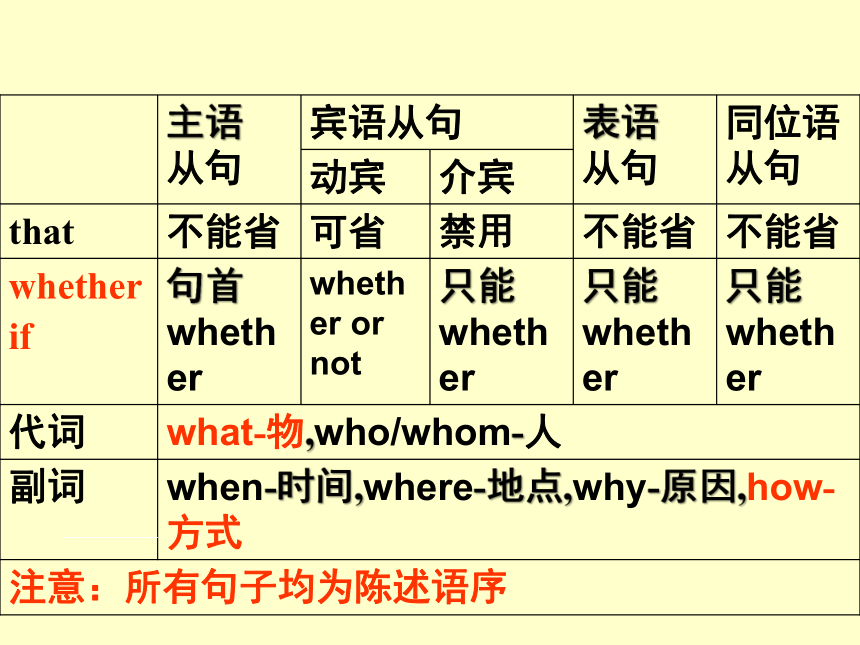
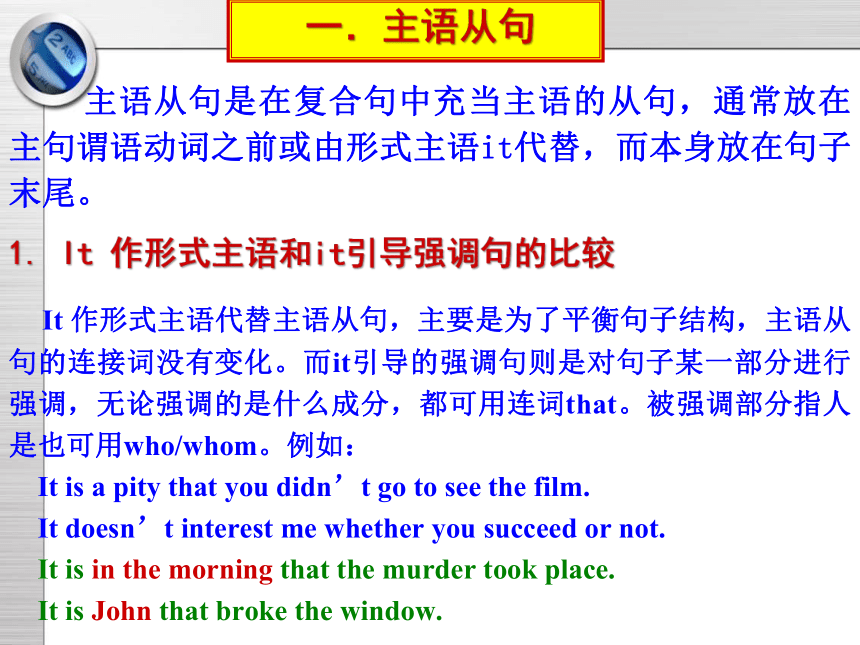
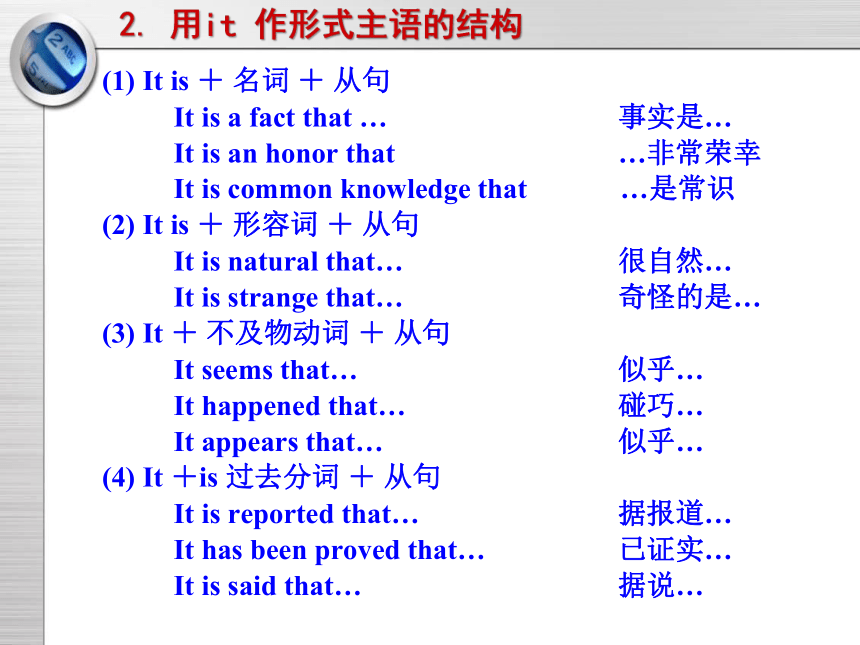
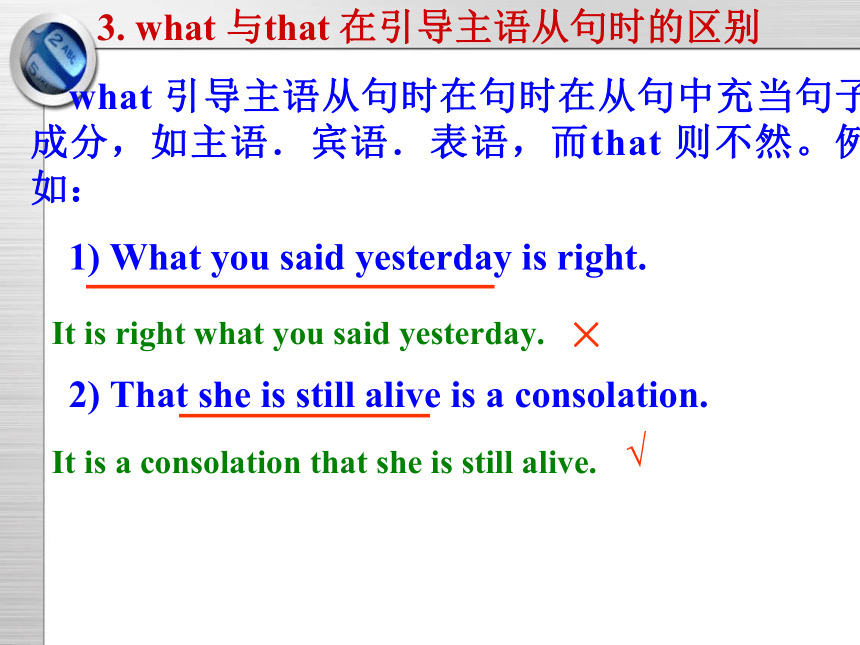

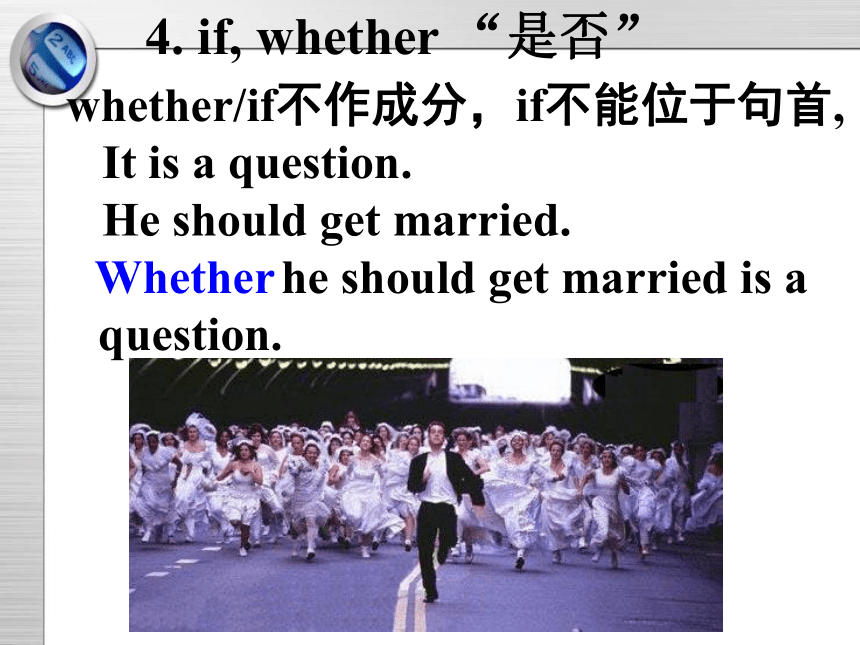
文档简介
(共40张PPT)
名 词 性 从 句
名 词 性 从 句 的 概 念
主语+be+表语
主语+do+宾语
名 词
名 词
是谁开始先出招没什么大不了
...告诉我今天海是什么颜色
...告诉我今夜你想要梦什么
终于你会发现每个爱情都危险
Who takes the first step is not a big deal.
Tell me what color the sea is today
Tell me what you want to dream of tonight
Finally you’ll find out that every love is
dangerous
主语从句
宾语从句
表语从句
同位语从句
名词性从句
DATE
TAKE
SCENES
10
1
PRODUCTION
CREATED WITH
Li Xiangmin
Microsoft PowerPoint
名词性从句引导词
主语 从句 宾语从句 表语 从句 同位语从句
动宾 介宾 that 不能省 可省 禁用 不能省 不能省
whether if 句首whether whether or not 只能whether 只能whether 只能whether
代词 what-物,who/whom-人 副词 when-时间,where-地点,why-原因,how-方式 注意:所有句子均为陈述语序
一.主语从句
主语从句是在复合句中充当主语的从句,通常放在主句谓语动词之前或由形式主语it代替,而本身放在句子末尾。
1. It 作形式主语和it引导强调句的比较
It 作形式主语代替主语从句,主要是为了平衡句子结构,主语从句的连接词没有变化。而it引导的强调句则是对句子某一部分进行强调,无论强调的是什么成分,都可用连词that。被强调部分指人是也可用who/whom。例如:
It is a pity that you didn’t go to see the film.
It doesn’t interest me whether you succeed or not.
It is in the morning that the murder took place.
It is John that broke the window.
2. 用it 作形式主语的结构
(1) It is + 名词 + 从句
It is a fact that … 事实是…
It is an honor that …非常荣幸
It is common knowledge that …是常识
(2) It is + 形容词 + 从句
It is natural that… 很自然…
It is strange that… 奇怪的是…
(3) It + 不及物动词 + 从句
It seems that… 似乎…
It happened that… 碰巧…
It appears that… 似乎…
(4) It +is 过去分词 + 从句
It is reported that… 据报道…
It has been proved that… 已证实…
It is said that… 据说…
3. what 与that 在引导主语从句时的区别
what 引导主语从句时在句时在从句中充当句子成分,如主语.宾语.表语,而that 则不然。例如:
1) What you said yesterday is right.
2) That she is still alive is a consolation.
It is right what you said yesterday.
It is a consolation that she is still alive.
×
√
that不作成分, 无翻译,但不能省
It is unfair.
Women are treated unequally in some areas.
women are treated unequally in some areas is unfair.
It is undoubted.
Diaoyu Island belongs to China.
Diaoyu Island belongs to China is undoubted.
That
That
whether/if不作成分,if不能位于句首,
It is a question.
He should get married.
he should get married is a question.
4. if, whether “是否”
Whether
5. wh-词作成分, 引导陈述语序
连接代词:what, who
连接副词:when, where, why, how
It is not a big deal.
Who takes the first step is
_ we’ll go camping tomorrow depends
on the weather.
A. If B. Whether C. That D. Where
_ you have done might do harm to other
people.
A. That B. What C. Which D. This
B
B
_ has been announced that we shall have
our final exam next month.
A. As B. It C. What D. That
_ caused the accident is still a complete
mystery.
A. What B. That C. How D. Where
B
A
二.宾语从句
宾语从句就是在复合句中作宾语的名词性从句,通常放在主句谓语动词 (及物动词) 或介词之后。
1. 作动词的宾语
(1) 由that引导的宾语从句(that 通常可以省略), 例如:
I heard that he joined the army.
(2) 由what, whether (if) 引导的宾语从句,例如:
She did not know what had happened.
I wonder whether you can change this note for me.
(3) 动词+间接宾语+宾语从句。例如:
She told me that she would accept my invitation.
二.宾语从句
2. 作介词的宾语,例如:
Our success depends upon how well we can cooperate with one another.
3. 作形容词的宾语,例如:
I am afraid (that) I’ve made a mistake.
注意:that 引导的从句常跟在下列形容词后作宾语:
anxious, aware, certain, confident, convinced, determined, glad, proud, surprised, worried, sorry, thankful, ashamed, disappointed, annoyed, pleased, hurt, satisfied, content 等。也可以将此类词后的that 从句的看作原因状语从句。
4. it 可以作为形式宾语
it 不仅可以作为形式主语,还可以作为形式宾语而真正的宾语that 从句则放在句尾,特别是在带复合宾语的句子中。 例如:
We heard it that she would get married next month.
5. 后边不能直接跟that 从句的动词
这类动词有allow, refuse, let, like, cause, force, admire, condemn, celebrate, dislike, love, help, take, forgive等。这类词后可以用不定式或动名词作宾语,但不可以用that引导的宾语从句。如:
I admire their winning the match.
I admire that they won the match.
√
×
6. 不可用that从句作直接宾语的动词
有些动词不可用于“动词+间接宾语+that从句“结构中,常见的有envy, order, accuse, refuse, impress, forgive, blame, denounce, advise, congratulate等。例如:
He impressed the manager as an honest man.
He impressed the manager that he was an honest man.
√
×
7. 否定的转移
若主句谓语动词为think, consider, suppose, believe, expect, fancy, guess, imagine等,其后的宾语从句若含有否定意义,一般要把否定词转移到主句谓语上,从句谓语用肯定式。例如:
I don’t think this dress fits you well. 我认为这件衣服不适合你穿。
wh-词+陈述语序
连接代词:who, what
连接副词:when, where, why, how
《我是谁》
《忘了我是谁》
who am I
forget who I am
《你是谁》
《忘了你是谁》
who are you
forget who you are
宾语从句的时态一致:
主句--过去, 宾从--过去
例外: 主句--过去,
宾从--一般现在 (真理性事实)
My mother told me the sun ____ from the east.
Tom asked me why KFC _____ its price again.
(raise, rise)
rises
raised
He asked _ for the violin.
A. did I pay how much B. I paid how much
C. how much did I pay D. how much I paid
These photographs will show you _.
A. what does our village look like
B. what our village looks like
C. how does our village look like
D. how our village looks like
D
B
There was a big argument among the
children about _ move to a new house.
A. if they should B. that they ought
C. if should they D. whether they should
D
His grandfather was among the
first to settle in _ is now a famous
holiday center.
A. where B. which
C. what D. that
C
The children are talking about _
should be the leader of the group.
A. who B. whom
C. that D. whether
The person in charge is Mr. Lee about _ we just talked.
A. who B. whom
C. that D. whether
A
B
Do you still remember the day _ he came
A. where B. when C. that D. what
Do you remember _ he came
Yes, I do. He came by car.
A. how B. when C. that D. if
宾语从句 vs.定语从句
A
B
He came on the day.
The soldier soon reached _ was once an
old temple _ the village used as a
school.
A. where, which B. what, which
C. which, where D. what, where
B
三.表语从句
表语从句在复合句中作表语的名词性从句,放在系动词之后,一般结构是“主语+连系动词+表语从句”。可以接表语从句的连系动词有be, look, remain, seem等。引导表语从句的that常可省略。另外,常用的还有the reason is that… 和It is because 等结构。例如:
1) The question is whether we can make good preparation in such a short time.
2) This is why we can’t get the support of the people.
3) But the fact remains that we are behind the other classes.
4) The reason why he is late for school is that he missed the early bus.
表语从句
that不作成分, 无翻译, 可以省略
whether “是否”, if 禁用
特殊疑问词+陈述句
who, what
when, where, why, how
Your ability has never been in doubt—
the question is _ you are prepared to
work hard.
A. that B. whether C. if D. how
B
We that even our bad days have
bright moments.
You can what you want to do,
what you want to have,
and what you want to be.
宾语从句和表语从句
find
do
have
be
宾
语
从
句
表语从句
四.同位语从句
1. 同位语从句的功能
同位语从句对于名词进一步解释,说明名词的具体内容,一般由that引导,例如:
1) The king’s decision that the prisoner would be set free surprised all the people.
2) The order that all the soldiers should stay still is given by the general.
同位语从句就是在复合句中作名词的同位语的名词性从句。
四.同位语从句
2. 同位语在句子中的位置
同位语从句有时可以不紧跟在它所说明的名词后面,而是被别的词隔开。例如:
He got the news from Mary that the sports meeting was put off.
名词和同位语从句同等地位
同位语从句结构完整
3. 同位语从句与定语从句的区别
(1) 定语从句中的that既代替先行词,同时以在从句中作某个成分(主语或宾语),而同位语从句中的that是连词,只起连接主句与从句的作用,不充当句中任何成分。
(2) 定语从句是形容词性的,其功能是修饰先行词,对先行词加以限定,描述定的性质或特征;同位语从句是名词性的,其功能是对名词进行补充说明。例如:
3. 同位语从句与定语从句的区别
The news that he told me is that Tom would go abroad next year.
他告诉我的消息是汤姆明年将出国。
2)The news that Tom would go abroad is told by him.
汤姆将出国的消息是他讲的。
第一个that引导的从句是定语从句,that在从句中作宾语
同位语从句,that在句中不作任何成分
1.It is important that ______ our education in all available ways.
A. we must develop B. we shall develop
C. we would develop D. we should develop
2.It is necessary that ______ by the end of the week.
A. we got everything ready B. we have got everything ready
C. We get everything ready D. we must get everything ready
3.It was natural that _______.
A. my pictures would surprise them
B. my pictures surprised them
C. my pictures should surprise them
D. my pictures would have surprised them
4.I wonder _______.
A. whether or not I’ll catch the last bus
B. if or not I’ll catch the last bus
C. that I’ll catch the last bus or not
D. that I’ll catch the last bus
5.We all thought ______ a pity that we had missed the lesson.
A. so B. such C. it D. that
6.I took ______ for granted that they were not coming.
A. that B. this C. it D. so
7.I heard ______was said that he had great concern for his classmates.
A. and B. that C. was D. it
8.I wish I ______ to the football match last night.
A. went B. go C. should go D. had gone
whatever引导的名词性从句
whatever的意思是“所……的一切事或东西”,可视为what的强调说法,其含义大致相当于anything that,whatever在从句中可用作主语、宾语。
Do whatever she tells you and you’ll have peace.
她叫你干什么你就干什么,那你就太平了。
I don’t believe in letting children do whatever they like.
我不赞成让孩子为所欲为。
whoever引导的名词性从句
whoever的意思“任何……的人”,在意义上大致相当于 anybody who。whoever在从句中可用作主语或宾语。如:
I’ll take whoever wants to go. 谁想去我就带谁去。
Whoever says that is a liar. 说那话的人是个骗子。
She can marry whoever she chooses. 她愿意嫁谁就嫁谁。
I’ll give the ticket to whoever wants it. 谁想要这票,我就把它给谁。
Tell whoever you like — it makes no difference to me. 你爱告诉谁就告诉谁吧,对我是无所谓的。
注意以下受汉语意思影响而弄错的句子:
谁赢了都可以获奖。
Who wins can get a prize.
Anyone wins can get a prize.
Whoever wins can get a prize.
Anyone who wins can get a prize.
名 词 性 从 句
名 词 性 从 句 的 概 念
主语+be+表语
主语+do+宾语
名 词
名 词
是谁开始先出招没什么大不了
...告诉我今天海是什么颜色
...告诉我今夜你想要梦什么
终于你会发现每个爱情都危险
Who takes the first step is not a big deal.
Tell me what color the sea is today
Tell me what you want to dream of tonight
Finally you’ll find out that every love is
dangerous
主语从句
宾语从句
表语从句
同位语从句
名词性从句
DATE
TAKE
SCENES
10
1
PRODUCTION
CREATED WITH
Li Xiangmin
Microsoft PowerPoint
名词性从句引导词
主语 从句 宾语从句 表语 从句 同位语从句
动宾 介宾 that 不能省 可省 禁用 不能省 不能省
whether if 句首whether whether or not 只能whether 只能whether 只能whether
代词 what-物,who/whom-人 副词 when-时间,where-地点,why-原因,how-方式 注意:所有句子均为陈述语序
一.主语从句
主语从句是在复合句中充当主语的从句,通常放在主句谓语动词之前或由形式主语it代替,而本身放在句子末尾。
1. It 作形式主语和it引导强调句的比较
It 作形式主语代替主语从句,主要是为了平衡句子结构,主语从句的连接词没有变化。而it引导的强调句则是对句子某一部分进行强调,无论强调的是什么成分,都可用连词that。被强调部分指人是也可用who/whom。例如:
It is a pity that you didn’t go to see the film.
It doesn’t interest me whether you succeed or not.
It is in the morning that the murder took place.
It is John that broke the window.
2. 用it 作形式主语的结构
(1) It is + 名词 + 从句
It is a fact that … 事实是…
It is an honor that …非常荣幸
It is common knowledge that …是常识
(2) It is + 形容词 + 从句
It is natural that… 很自然…
It is strange that… 奇怪的是…
(3) It + 不及物动词 + 从句
It seems that… 似乎…
It happened that… 碰巧…
It appears that… 似乎…
(4) It +is 过去分词 + 从句
It is reported that… 据报道…
It has been proved that… 已证实…
It is said that… 据说…
3. what 与that 在引导主语从句时的区别
what 引导主语从句时在句时在从句中充当句子成分,如主语.宾语.表语,而that 则不然。例如:
1) What you said yesterday is right.
2) That she is still alive is a consolation.
It is right what you said yesterday.
It is a consolation that she is still alive.
×
√
that不作成分, 无翻译,但不能省
It is unfair.
Women are treated unequally in some areas.
women are treated unequally in some areas is unfair.
It is undoubted.
Diaoyu Island belongs to China.
Diaoyu Island belongs to China is undoubted.
That
That
whether/if不作成分,if不能位于句首,
It is a question.
He should get married.
he should get married is a question.
4. if, whether “是否”
Whether
5. wh-词作成分, 引导陈述语序
连接代词:what, who
连接副词:when, where, why, how
It is not a big deal.
Who takes the first step is
_ we’ll go camping tomorrow depends
on the weather.
A. If B. Whether C. That D. Where
_ you have done might do harm to other
people.
A. That B. What C. Which D. This
B
B
_ has been announced that we shall have
our final exam next month.
A. As B. It C. What D. That
_ caused the accident is still a complete
mystery.
A. What B. That C. How D. Where
B
A
二.宾语从句
宾语从句就是在复合句中作宾语的名词性从句,通常放在主句谓语动词 (及物动词) 或介词之后。
1. 作动词的宾语
(1) 由that引导的宾语从句(that 通常可以省略), 例如:
I heard that he joined the army.
(2) 由what, whether (if) 引导的宾语从句,例如:
She did not know what had happened.
I wonder whether you can change this note for me.
(3) 动词+间接宾语+宾语从句。例如:
She told me that she would accept my invitation.
二.宾语从句
2. 作介词的宾语,例如:
Our success depends upon how well we can cooperate with one another.
3. 作形容词的宾语,例如:
I am afraid (that) I’ve made a mistake.
注意:that 引导的从句常跟在下列形容词后作宾语:
anxious, aware, certain, confident, convinced, determined, glad, proud, surprised, worried, sorry, thankful, ashamed, disappointed, annoyed, pleased, hurt, satisfied, content 等。也可以将此类词后的that 从句的看作原因状语从句。
4. it 可以作为形式宾语
it 不仅可以作为形式主语,还可以作为形式宾语而真正的宾语that 从句则放在句尾,特别是在带复合宾语的句子中。 例如:
We heard it that she would get married next month.
5. 后边不能直接跟that 从句的动词
这类动词有allow, refuse, let, like, cause, force, admire, condemn, celebrate, dislike, love, help, take, forgive等。这类词后可以用不定式或动名词作宾语,但不可以用that引导的宾语从句。如:
I admire their winning the match.
I admire that they won the match.
√
×
6. 不可用that从句作直接宾语的动词
有些动词不可用于“动词+间接宾语+that从句“结构中,常见的有envy, order, accuse, refuse, impress, forgive, blame, denounce, advise, congratulate等。例如:
He impressed the manager as an honest man.
He impressed the manager that he was an honest man.
√
×
7. 否定的转移
若主句谓语动词为think, consider, suppose, believe, expect, fancy, guess, imagine等,其后的宾语从句若含有否定意义,一般要把否定词转移到主句谓语上,从句谓语用肯定式。例如:
I don’t think this dress fits you well. 我认为这件衣服不适合你穿。
wh-词+陈述语序
连接代词:who, what
连接副词:when, where, why, how
《我是谁》
《忘了我是谁》
who am I
forget who I am
《你是谁》
《忘了你是谁》
who are you
forget who you are
宾语从句的时态一致:
主句--过去, 宾从--过去
例外: 主句--过去,
宾从--一般现在 (真理性事实)
My mother told me the sun ____ from the east.
Tom asked me why KFC _____ its price again.
(raise, rise)
rises
raised
He asked _ for the violin.
A. did I pay how much B. I paid how much
C. how much did I pay D. how much I paid
These photographs will show you _.
A. what does our village look like
B. what our village looks like
C. how does our village look like
D. how our village looks like
D
B
There was a big argument among the
children about _ move to a new house.
A. if they should B. that they ought
C. if should they D. whether they should
D
His grandfather was among the
first to settle in _ is now a famous
holiday center.
A. where B. which
C. what D. that
C
The children are talking about _
should be the leader of the group.
A. who B. whom
C. that D. whether
The person in charge is Mr. Lee about _ we just talked.
A. who B. whom
C. that D. whether
A
B
Do you still remember the day _ he came
A. where B. when C. that D. what
Do you remember _ he came
Yes, I do. He came by car.
A. how B. when C. that D. if
宾语从句 vs.定语从句
A
B
He came on the day.
The soldier soon reached _ was once an
old temple _ the village used as a
school.
A. where, which B. what, which
C. which, where D. what, where
B
三.表语从句
表语从句在复合句中作表语的名词性从句,放在系动词之后,一般结构是“主语+连系动词+表语从句”。可以接表语从句的连系动词有be, look, remain, seem等。引导表语从句的that常可省略。另外,常用的还有the reason is that… 和It is because 等结构。例如:
1) The question is whether we can make good preparation in such a short time.
2) This is why we can’t get the support of the people.
3) But the fact remains that we are behind the other classes.
4) The reason why he is late for school is that he missed the early bus.
表语从句
that不作成分, 无翻译, 可以省略
whether “是否”, if 禁用
特殊疑问词+陈述句
who, what
when, where, why, how
Your ability has never been in doubt—
the question is _ you are prepared to
work hard.
A. that B. whether C. if D. how
B
We that even our bad days have
bright moments.
You can what you want to do,
what you want to have,
and what you want to be.
宾语从句和表语从句
find
do
have
be
宾
语
从
句
表语从句
四.同位语从句
1. 同位语从句的功能
同位语从句对于名词进一步解释,说明名词的具体内容,一般由that引导,例如:
1) The king’s decision that the prisoner would be set free surprised all the people.
2) The order that all the soldiers should stay still is given by the general.
同位语从句就是在复合句中作名词的同位语的名词性从句。
四.同位语从句
2. 同位语在句子中的位置
同位语从句有时可以不紧跟在它所说明的名词后面,而是被别的词隔开。例如:
He got the news from Mary that the sports meeting was put off.
名词和同位语从句同等地位
同位语从句结构完整
3. 同位语从句与定语从句的区别
(1) 定语从句中的that既代替先行词,同时以在从句中作某个成分(主语或宾语),而同位语从句中的that是连词,只起连接主句与从句的作用,不充当句中任何成分。
(2) 定语从句是形容词性的,其功能是修饰先行词,对先行词加以限定,描述定的性质或特征;同位语从句是名词性的,其功能是对名词进行补充说明。例如:
3. 同位语从句与定语从句的区别
The news that he told me is that Tom would go abroad next year.
他告诉我的消息是汤姆明年将出国。
2)The news that Tom would go abroad is told by him.
汤姆将出国的消息是他讲的。
第一个that引导的从句是定语从句,that在从句中作宾语
同位语从句,that在句中不作任何成分
1.It is important that ______ our education in all available ways.
A. we must develop B. we shall develop
C. we would develop D. we should develop
2.It is necessary that ______ by the end of the week.
A. we got everything ready B. we have got everything ready
C. We get everything ready D. we must get everything ready
3.It was natural that _______.
A. my pictures would surprise them
B. my pictures surprised them
C. my pictures should surprise them
D. my pictures would have surprised them
4.I wonder _______.
A. whether or not I’ll catch the last bus
B. if or not I’ll catch the last bus
C. that I’ll catch the last bus or not
D. that I’ll catch the last bus
5.We all thought ______ a pity that we had missed the lesson.
A. so B. such C. it D. that
6.I took ______ for granted that they were not coming.
A. that B. this C. it D. so
7.I heard ______was said that he had great concern for his classmates.
A. and B. that C. was D. it
8.I wish I ______ to the football match last night.
A. went B. go C. should go D. had gone
whatever引导的名词性从句
whatever的意思是“所……的一切事或东西”,可视为what的强调说法,其含义大致相当于anything that,whatever在从句中可用作主语、宾语。
Do whatever she tells you and you’ll have peace.
她叫你干什么你就干什么,那你就太平了。
I don’t believe in letting children do whatever they like.
我不赞成让孩子为所欲为。
whoever引导的名词性从句
whoever的意思“任何……的人”,在意义上大致相当于 anybody who。whoever在从句中可用作主语或宾语。如:
I’ll take whoever wants to go. 谁想去我就带谁去。
Whoever says that is a liar. 说那话的人是个骗子。
She can marry whoever she chooses. 她愿意嫁谁就嫁谁。
I’ll give the ticket to whoever wants it. 谁想要这票,我就把它给谁。
Tell whoever you like — it makes no difference to me. 你爱告诉谁就告诉谁吧,对我是无所谓的。
注意以下受汉语意思影响而弄错的句子:
谁赢了都可以获奖。
Who wins can get a prize.
Anyone wins can get a prize.
Whoever wins can get a prize.
Anyone who wins can get a prize.
